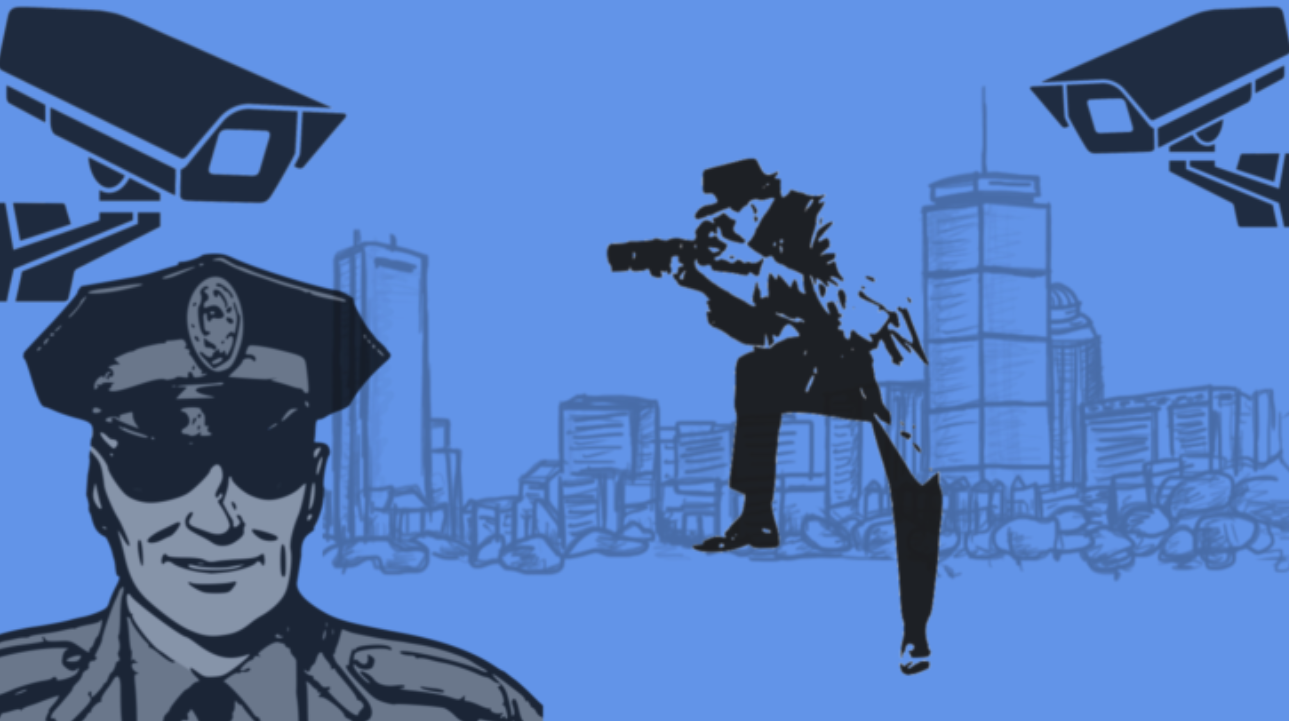BPD seeks access to private security cameras, experiments with new surveillance network
The Boston Police Department wants to deputize your surveillance system.
After a crime, police canvass for private security cameras. Sometimes, they obtain a warrant for the tapes or data, or simply ask for the owner’s consent to access footage. But since last November, in Dorchester, the BPD has had CAM-Share, a pilot program that geolocates and permits officers on-site access to volunteers’ cameras.
For now, the BPD wants to help officers more quickly locate and access footage. However, if the program expands beyond its small introduction — about 13 locations, according to BPD records — it could develop into a centralized surveillance network.
Last year, Sgt. Detective James Cullity pitched CAM-Share to BPD command.
“With all the private video systems in place, I thought it would be a great idea to build a database of known video camera locations that capture street views,” Cullity wrote in an email obtained in a freedom of information request.
Over the phone, Cullity cited a scene from Patriots Day, a film about the 2013 Boston Bombing, to illustrate how he imagines CAM-Share working.
After the attack, local officer Tommy Saunders (not a real person) walks through a recreation of the Boylston Street crime scene. A BPD veteran, he remembers which places have security cameras and helps the FBI identify the two bombers.
“That’s a perfect example,” said Cullity. “But instead of having to pick a guy’s brain, we’d already know.”
CAM-Share footage is not livestreamed. The BPD does not yet have the technology to connect different kinds of surveillance systems, according to a department spokesperson. However, like other police departments in Grand Rapids, Detroit, and Austin, the BPD has voiced a mild desire to use private security cameras to expand real-time monitoring.
Recently, the Dorchester Reporter interviewed Captain Connolly, a commanding officer in Dorchester, about the future of CAM-Share. “Eventually, with the consent of private citizens,” the newspaper wrote, paraphrasing Connolly, “the cameras could be patched into a citywide intelligence unit run by Boston police to give investigators even more immediate access to video.”
Connolly’s imagined system is a problem, said Kade Crockford, Massachusetts director of the ACLU’s Technology for Liberty Program. “It’s not just an issue of a small private camera” that might assist an investigation, she explained. “It’s a nod to a much more dangerous future in which the police have a window in private and public areas in which they have no business snooping around.”
This is not the first time the ACLU has criticized BPD surveillance tactics. Last month, the ACLU released a report revealing the BPD collected thousands of social media posts with the terms #blacklivesmatter,” “protest,” “#muslimlivesmatter,” and everyday Arabic words from 2014 to 2016. That program is no longer active.
The BPD has at least four ways to collect information on Boston’s private security cameras. First, to publicize CAM-Share, community service officers have announced the program to residents at local neighborhood meetings. Second, BPD records show Cullity floated the idea of offering tax credits to “builders and store owners” that install surveillance systems and give BPD access. However, according to a department spokesperson, that incentive might make volunteers “agents of the police,” requiring additional regulation.
Third, some officers, Cullity explained over the phone, may in the near future be supplied with a cell phone or iPad to catalog locations. If an officer finds a camera, they’ll hit a button, and the camera’s geolocation will be sent to the BPD’s Regional Intelligence Center. But knowing a camera’s location is not enough, Cullity added. Does the camera actually work? For how long does it store footage? What does the camera see? It all depends on what camera-owning volunteers share with the BPD.
Finally, to recruit volunteers, the BPD sent out a three-page form asking for info, including the make, model, and access password of their cameras. The letter also asked volunteers sign a pledge “not to release any footage or still images to the media without consulting with Boston Police Department Media Relations.”
That language is meant to protect the integrity of a BPD investigation, a spokesperson said, adding CAM-Share volunteers are not legally obligated to follow the rule. Still, Crockford believes the BPD should remove that language from the letter.
“What if there’s an altercation involving a police officer, and they shoot someone?” she said. “Even if the BPD doesn’t think that’s legally enforceable, that’s still intimidating to a person thinking about giving that information to defense counsel or a newspaper. It’s chilling.”
A few years ago, the BPD had a similar program with the Building Owners and Managers Association, a large group for real estate professionals. According to BPD records, the program “lost steam and wasn’t completed.”
For now, CAM-Share is a small pilot program that has not yet helped solve a crime, and it’s nowhere close to evolving into BPD closed circuit television. Instead, it’s a Dorchester officer’s idea that depends on the city’s participation.
Will it lose steam, or not?










